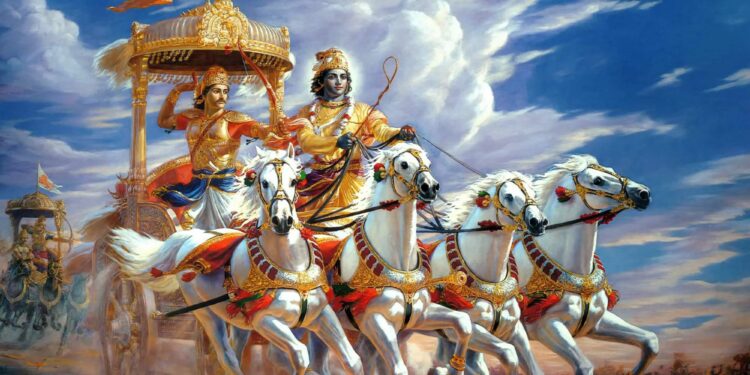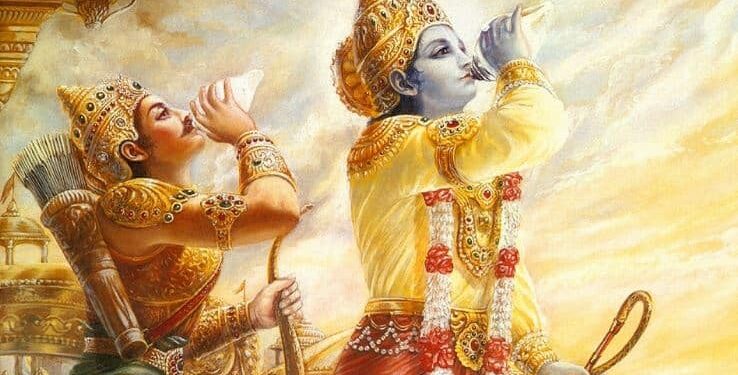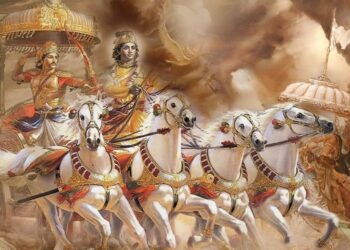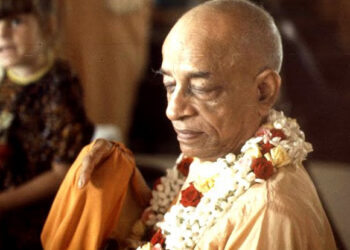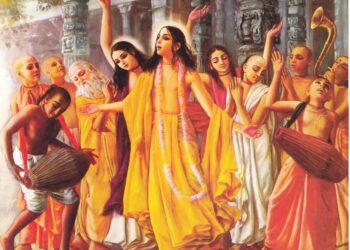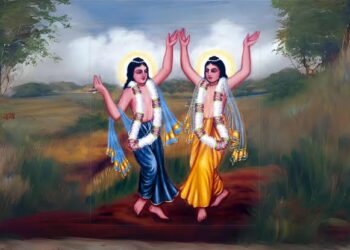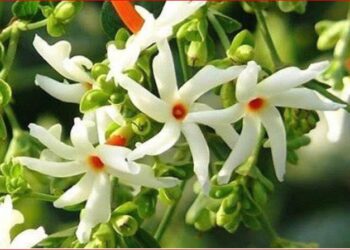TEXT 36
arjuna uvāca
atha kena prayukto ‘yaṁ
pāpaṁ carati pūruṣaḥ
anicchann api vārṣṇeya
balād iva niyojitaḥ
SYNONYMS
arjunaḥ uvāca—Arjuna said; atha—then; kena—by what; prayuktaḥ—impelled; ayam—one; pāpam—sins; carati—does; pūruṣaḥ—a man; anicchan—without desiring; api—although; vārṣṇeya—O descendant of Vṛṣṇi; balāt—by force; iva—as if; niyojitaḥ—engaged.
TRANSLATION
Arjuna said: O descendant of Vṛṣṇi, by what is one impelled to sinful acts, even unwillingly, as if engaged by force?
PURPORT
A living entity, as part and parcel of the Supreme, is originally spiritual, pure, and free from all material contaminations. Therefore, by nature he is not subject to the sins of the material world. But when he is in contact with the material nature, he acts in many sinful ways without hesitation, and sometimes even against his will. As such, Arjuna’s question to Kṛṣṇa is very sanguine, as to the perverted nature of the living entities. Although the living entity sometimes does not want to act in sin, he is still forced to act. Sinful actions are not, however, impelled by the Supersoul within, but are due to another cause, as the Lord explains in the next verse.
TEXT 37
śrī-bhagavān uvāca
kāma eṣa krodha eṣa
rajo-guṇa-samudbhavaḥ
mahāśano mahā-pāpmā
viddhy enam iha vairiṇam
SYNONYMS
śri-bhagavān uvāca—the Personality of Godhead said; kāmaḥ—lust; eṣaḥ—this; krodhaḥ—wrath; eṣaḥ—this; rajaḥ-guṇa—the mode of passion; samudbhavaḥ—born of; mahā-aśanaḥ—all-devouring; mahā-pāpmā—greatly sinful; viddhi—know; enam—this; iha—in the material world; vairiṇam—greatest enemy.
TRANSLATION
The Supreme Personality of Godhead said: It is lust only, Arjuna, which is born of contact with the material mode of passion and later transformed into wrath, and which is the all-devouring sinful enemy of this world.
PURPORT
When a living entity comes in contact with the material creation, his eternal love for Kṛṣṇa is transformed into lust, in association with the mode of passion. Or, in other words, the sense of love of God becomes transformed into lust, as milk in contact with sour tamarind is transformed into yogurt. Then again, when lust is unsatisfied, it turns into wrath; wrath is transformed into illusion, and illusion continues the material existence. Therefore, lust is the greatest enemy of the living entity, and it is lust only which induces the pure living entity to remain entangled in the material world. Wrath is the manifestation of the mode of ignorance; these modes exhibit themselves as wrath and other corollaries. If, therefore, the mode of passion, instead of being degraded into the mode of ignorance, is elevated to the mode of goodness by the prescribed method of living and acting, then one can be saved from the degradation of wrath by spiritual attachment.
The Supreme Personality of Godhead expanded Himself into many for His ever-increasing spiritual bliss, and the living entities are parts and parcels of this spiritual bliss. They also have partial independence, but by misuse of their independence, when the service attitude is transformed into the propensity for sense enjoyment, they come under the sway of lust. This material creation is created by the Lord to give facility to the conditioned souls to fulfill these lustful propensities, and when completely baffled by prolonged lustful activities, the living entities begin to inquire about their real position.
This inquiry is the beginning of the Vedānta-sūtras, wherein it is said, athāto brahma jijñāsā: one should inquire into the Supreme. And the Supreme is defined in Śrīmad-Bhāgavatam as janmādy asya yato ‘nvayād itarataś ca, or, “The origin of everything is the Supreme Brahman.” Therefore the origin of lust is also in the Supreme. If, therefore, lust is transformed into love for the Supreme, or transformed into Kṛṣṇa consciousness—or, in other words, desiring everything for Kṛṣṇa—then both lust and wrath can be spiritualized. Hanumān, the great servitor of Lord Rāma, exhibited his wrath by burning the golden city of Rāvaṇa, but by doing so he became the greatest devotee of the Lord. Here also, in Bhagavad-gītā, the Lord induces Arjuna to engage his wrath upon his enemies for the satisfaction of the Lord. Therefore, lust and wrath, when they are employed in Kṛṣṇa consciousness, become our friends instead of our enemies.


